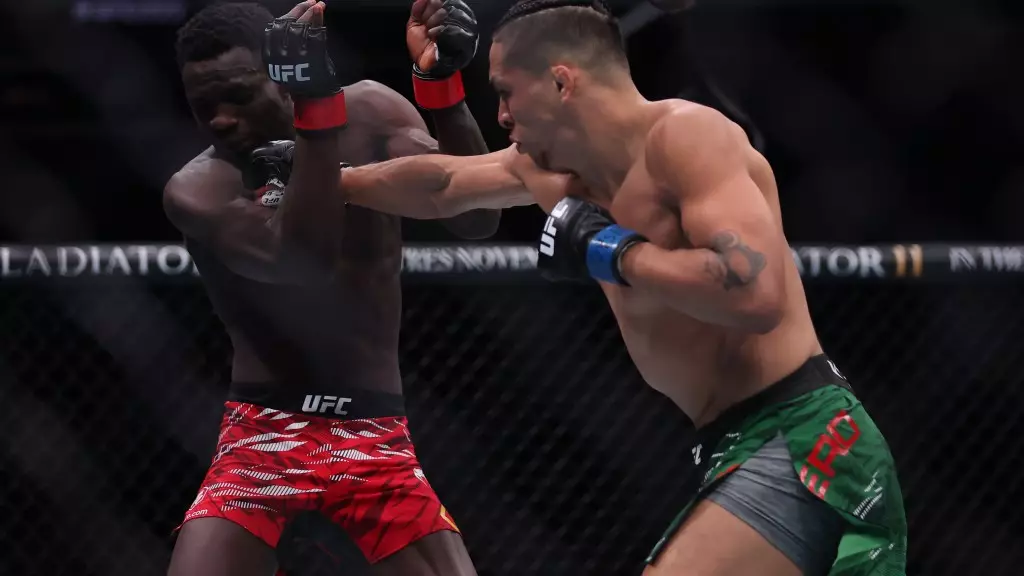Roberto Romero’s introduction to the UFC spotlight at UFC 309 on Saturday has left an indelible mark on both the audience and himself. Stepping into the octagon against seasoned fighter David Onama at Madison Square Garden, Romero represented the spirit of resilience. Taking this fight on short notice, just four days prior, positioned him at an acute disadvantage. Tasked with replacing Lucas Almeida, the Mexican fighter entered with limited preparation, facing a monumental challenge against a -1000 betting favorite. Despite the daunting odds, Romero’s performance against Onama showcased not just his skill, but also his potential as an emerging star within the UFC landscape.
The bout itself was somewhat of a rollercoaster. Romero started ferociously, displaying remarkable striking capability and almost finishing Onama in the first round. It was a moment that had the crowd on edge, sensing the underdog’s unique skill set could just turn the tide of the encounter. However, the match shifted dramatically after the initial flurry of action. Onama composed himself and began to implement his game plan, pushing back against Romero’s onslaught. The fight eventually wore on, with Onama rallying for control, demonstrating the experience that comes with years in the sport. Romero managed to resist valiantly throughout, yet the adversity he faced highlighted a crucial aspect of mixed martial arts: the importance of experience in high-pressure situations.
Post-fight, Romero reflected on critical moments that defined the match. He explicitly acknowledged his choices during the heat of battle, especially the pivotal decision to take Onama’s back rather than continuing with his striking. In candid remarks to MMA Junkie, he revealed his ongoing analysis of these moments, expressing a mix of regret and acceptance. “The ‘what if’ doesn’t exist,” he acknowledged, demonstrating maturity in understanding the unpredictable nature of fighting. Such introspection showcases a fighter who is keenly aware of his strengths and weaknesses, a quality invaluable for any athlete aiming to grow and succeed in a competitive field.
The sting of defeat is familiar territory for any athlete, yet how one responds sets champions apart. Romero’s disappointment from this fight transformed into a learning experience rather quickly. He recognized that every setback can serve as a foundation for growth. “At the end of the day, this is a learning experience,” he stated. This perspective is vital in a sport where humility and resilience are just as important as skill and strength. The emotional aftershocks, he admitted, lingered—especially for someone who holds himself to perfectionist standards. Yet, he found solace in the support of coaches, family, and fans, demonstrating the community’s role in an athlete’s journey.
Beyond the fight’s outcome, what remains evident is that Roberto Romero has emerged from UFC 309 with more than just a loss; he carries with him the beginnings of a promising career. His ability to capture the audience’s attention, combined with his fighting spirit, paints a picture of a fighter who can and will grow. As he refines his skills and builds on his experiences, Romero is likely to learn from this high-profile challenge, further igniting the passion he possesses for the sport.
In professional sports, especially in the realm of mixed martial arts, one fight can often lead to new chapters. Seemingly, for Romero, this debut may very well be the start of a significantly impactful career, filled with lessons learned, battles fought, and victories yet to come. As he forges ahead, it will be exciting to watch how this rookie evolves into a seasoned contender. The canvas of Romero’s career is still being painted, and as it stands, the strokes appear vibrant and filled with promise.

